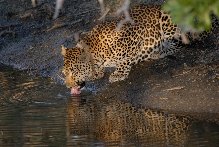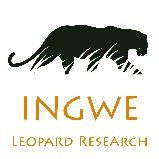Conservationists from Ingwe Leopard Research (www.ingweleopard.com) are helping to conserve the last of the infamous ‘big five’ still roaming free in South Africa.
The term ‘big five’ was first used by big game hunters to identify the most dangerous animals to hunt (Lion, Elephant, Rhino, Buffalo and Leopard). Thankfully it is a term that is now more likely to be associated with tourist safaris and game viewing.
Over the centuries most of the big five were hunted out in all but National Parks and Private Game Reserves. However that is not the case for leopards. They still survive (all be it in dwindling numbers) roaming free, mainly on rural farmland and in remote
mountainous areas.

The Ingwe Leopard Research team based near Lydenburg, Mpumalanga are working hard to gather data on the movement and behaviors of these animals and to help to protect the species. As is very common with any conservation project, human conflict is probably
the biggest issue they have to deal with. Whether that be from poaching or hunting.
Poachers’ snares account for an unknown number of leopard deaths each year, far in excess of the snares that are discovered. However it is also sadly true that leopard hunting is still prevalent. Livestock owners can still be being granted permits to kill
assumed livestock killers. Not only that but CITES enable one hundred and fifty hunting permits to be issued each year to international big game hunters looking for a skin to mount on their wall at home.
Although it is sometimes difficult to set aside the emotional and moral issues around the killing of leopards, there is a need to focus on the practical issues of control and regulation if we are to make any changes. Whilst a ban on all leopard hunting is
an ideal that many people would like to see in place, it is a long way off. A phased approach is required such that practical steps can be taken towards that goal. The first priority must be to gain a better understanding of leopard numbers and behaviors.
In this regard, facts can be a better form of ammunition than bullets. This work is in the remote cattle ranches and mountainous regions where most human conflict occurs. It is in these areas where leopards need to be protected from humans, but also farmer’s
livelihoods need to be protected from predators.
The leopard sits at the top of the food chain and its very presence is a key indicator of the ecological health of an area and should be celebrated as such. So what is the future of free roaming leopards? The bottom line is that Ingwe and many other similar
research groups need to continue with their work to gather data to help to affect wildlife management policies.
But in the meantime there is good news. There is a reason that leopards have survived so long, when lion, cheetah and other large predators have been hunted out. The leopard is a very adaptable creature. Over the last five years, the Ingwe Leopard Research
team has seen how leopards have adapted to changes in their area as land use and human pressure have changed. The team works in sparsely populated areas where they have helped to reduce hunting, with the resultant effect that leopards are becoming more relaxed
and can be seen as an asset for tourism rather than hunting. They are helping to establish leopard friendly areas in association with landowners and livestock farmers and within those areas develop pragmatic methods for farmers to live and work in harmony
with predators. That requires give and take and ongoing effort on all sides but there is light at the end of the tunnel.
In an effort to help to raise funds for their work, the Ingwe Leopard Research Team has developed a unique African safari for international guests. They believe that tourism and conservation go hand in hand. Each needs the other to succeed. With that in
mind, On Track Safaris (www.ontracksafarisuk.com) was formed to not only provide a unique big five safari experience and raise funds for conservation, but also to allow guests to go one step further than the normal safari rhetoric and become involved.

Author: Will Fox
ingweleopard@gmail.com
twitter will_fox
Skype will.fox5